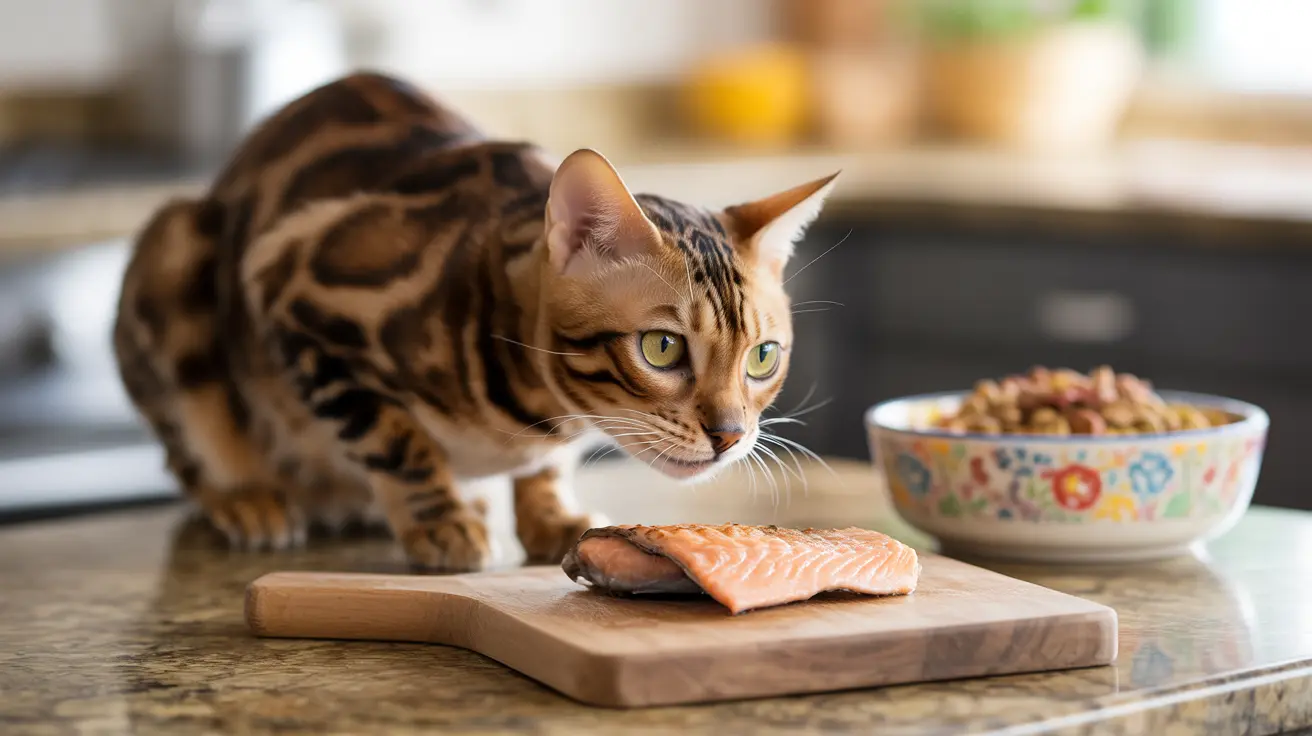The Nutritional Benefits of Salmon Skin
Salmon skin offers several valuable nutrients that can benefit your cat's health when served properly:
Omega-3 Fatty Acids
Salmon skin is particularly rich in omega-3 fatty acids, especially DHA and EPA. These essential nutrients support:
- Heart health and circulation
- Joint mobility and reduced inflammation
- Brain function and cognitive health
- Skin hydration and coat quality
Protein and Essential Nutrients
The skin contains high-quality protein and other vital nutrients, including:
- Complete amino acid profile
- Vitamin B12
- Potassium
- Taurine
Safe Preparation Guidelines
Cooking Methods
Always serve salmon skin cooked, never raw. Recommended preparation methods include:
- Baking without seasonings
- Poaching in plain water
- Grilling without oils or additives
Safety Precautions
When preparing salmon skin for your cat:
- Remove all bones thoroughly
- Avoid any seasonings, including salt
- Skip marinades and spices
- Ensure the skin is fully cooked
- Let it cool before serving
Potential Risks and Considerations
Health Concerns
Be aware of these potential risks when feeding salmon skin to cats:
- Allergic reactions
- Digestive upset from overconsumption
- Choking hazards if not properly prepared
- Risk of parasites in raw fish
When to Avoid Salmon Skin
Some cats should not consume salmon skin, including those with:
- Known fish allergies
- Certain medical conditions
- Special dietary restrictions
- History of digestive sensitivity
Proper Serving Guidelines
Follow these guidelines for safe serving:
- Offer as an occasional treat only
- Limit to small portions (roughly the size of your fingertip)
- Monitor your cat for any adverse reactions
- Keep treats to less than 10% of daily caloric intake
Frequently Asked Questions
Can cats safely eat salmon skin, and how should it be prepared?
Yes, cats can safely eat salmon skin when it's properly cooked without seasonings or additives. Always remove bones and ensure the skin is thoroughly cooked to eliminate harmful bacteria and parasites.
What are the health benefits of feeding salmon skin to cats?
Salmon skin provides omega-3 fatty acids, protein, vitamin B12, and taurine. These nutrients support heart health, brain function, skin condition, and coat quality.
Could my cat have an allergy to salmon or salmon skin, and what signs should I watch for?
Yes, fish allergies are possible. Watch for signs like itching, skin irritation, vomiting, diarrhea, or excessive grooming. If you notice these symptoms, discontinue feeding salmon skin and consult your veterinarian.
Why is it important to avoid raw, smoked, or seasoned salmon skin for cats?
Raw salmon skin may contain harmful bacteria and parasites. Smoked or seasoned versions often contain excessive salt and additives that can be toxic to cats. Plain, cooked salmon skin is the safest option.
How much salmon skin is safe to give my cat, and how often can it be offered as a treat?
Offer salmon skin as an occasional treat, limiting it to small portions once or twice a week. The total amount of treats, including salmon skin, should not exceed 10% of your cat's daily caloric intake.
Remember to always consult with your veterinarian before adding new foods to your cat's diet, especially if your pet has existing health conditions or dietary restrictions.






